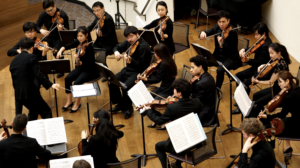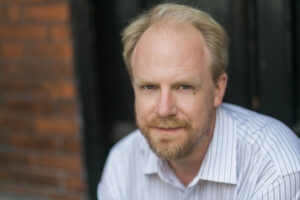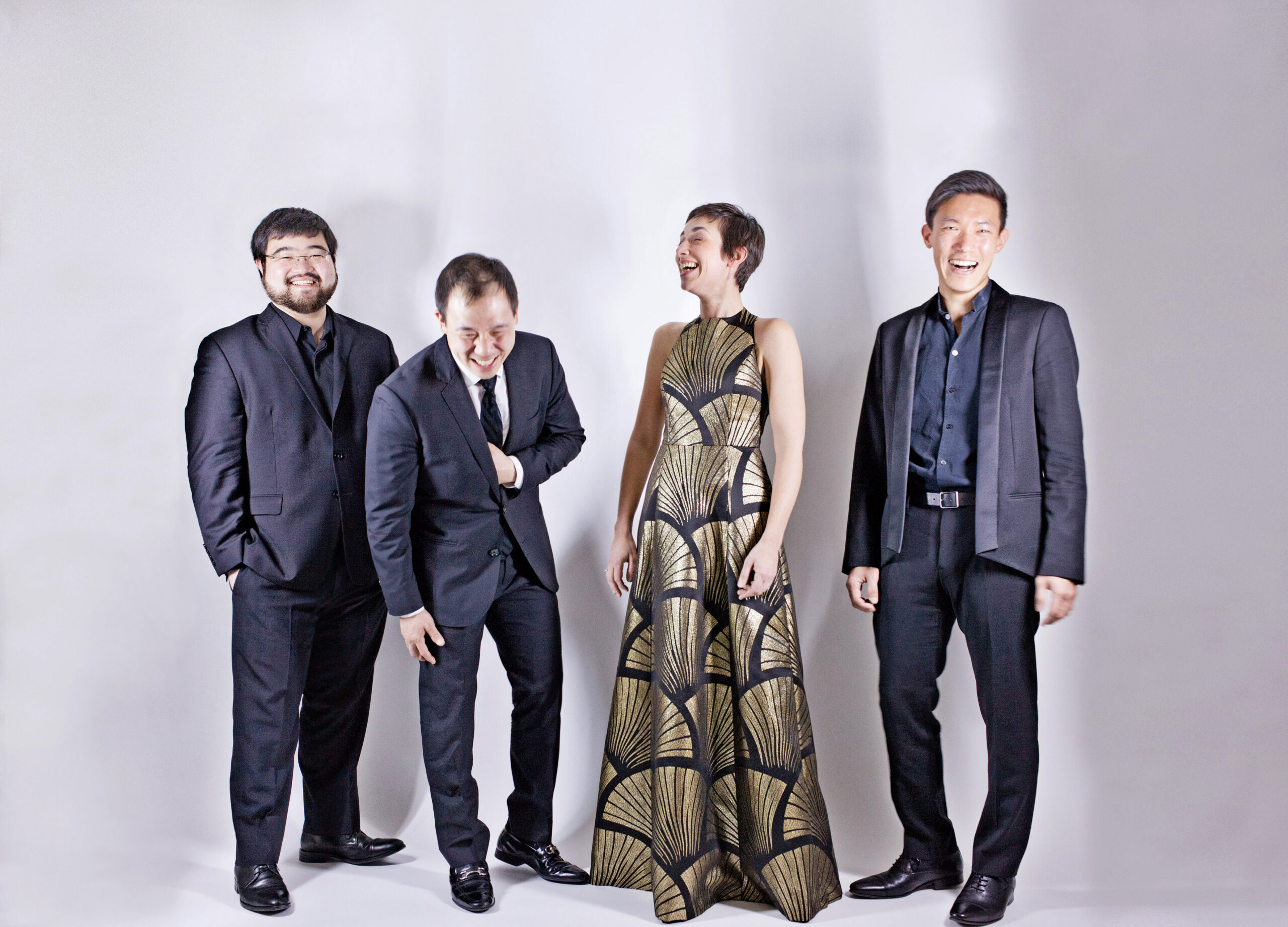The Parker Quartet premieres Jeremy Gill’s “Motherwhere”
April the First proved a propitious date for the New York Classical Players’ much anticipated program featuring a new collaboration – and premiere – with the Parker Quartet. In the mere twelve years since their inception, NYCP has consistently brought spirit and devotion to so much of what they do, and this early Spring concert at W83 Auditorium was no exception. In many respects, the highlight of the evening was Jeremy Gill’s joyous new work, “Motherwhere,” a concerto grosso for the Parker Quartet and NYCP. But well-worn, oft’-loved music by Tchaikovsky was also on offer, delivered with great heart. And that is how the evening began:
Opening the program as soloist in the Andante Cantabile for cello and strings, Madeline Fayette, (NYCP’s own), commanded centerstage. Forthright, with an immediate brand of lyricism, Fayette radiated warmth from her cello, upheld by a muscularity of execution. Her global tone seemed born of a seductively dark palette. While lush and nourishing was Fayette’s romantic sense, the coloring became all too similar at times. One hankered for more variety in sonority, extracted from the piano end of the dynamic spectrum. Brighter hues too, would have enhanced an admittedly emotionally satisfying reading. Conductor Dongmin Kim guided the chamber orchestra deftly, ever sensitive to Fayette’s richly etched lines. Notably, Tchaikovsky’s moments of silence were realized expertly by Fayette, aided again by the orchestra’s soft touch. At times it seemed as though conductor Kim was a little too aloof and might well have taken opportunity to invigorate the proceedings with contrasting textures and inner accompaniment parts, especially from the upper strings.

From the start, it was apparent that NYCP has an affinity for Tchaikovsky and such canonic works remain a hallmark of their repertoire. The second Tchaikovsky item on the program was the irresistible Serenade for Strings of 1880. It can easily be observed that the New York Classical Players straddle two worlds: that of a high-level ensemble who don’t really need a conductor, and that of the effortless sinfonietta who follow their leader with attentive skill and palpable delight. NYCP’s performance of the Serenade threw both spheres into sharp relief.
From the outset of Movement 1, this “Pezzo in forma di sonatina” bristled forth with an excess of springtide energy and conviction. Every single player was committed to the sum of the parts and proved adept at sweeping, upsprung passages. The full-blooded fortes were ever impressive, generous in their tonal production. The orchestra seemed less able to dig into the finer work of textural detail and soft timbres; refined aspects of blending were, at times, problematic. Nevertheless, moments of delicacy and whispered tunefulness were gloriously realized in the third movement, the Élégie.
In what has come to be earmarked as a personal work from Tchaikovsky, the Serenade’s folksy tendencies were cleverly enlightened by NYCP. At times, the spirit of Dvorak came to mind, as dance elements and rhythmic physicality were exemplified by the orchestra, flattering much of the performance. Kim’s conducting was precise and encouraging yet missed the larger picture. A “bird’s eye view” of this music would have been more satisfying.
A particularly memorable solo from the concert master nearly stole the show but it seemed to encourage the entire ensemble to really shoot for the top in the final movement, rhapsodically reaching every phrase with a breadth of expression. (This approach does prove effective – and often necessary! – in Tchaikovsky’s music.)
The evening’s premiere, Jeremy Gill’s Motherwhere, leapt to an earnest start, giving ample platform to the Parker Quartet’s myriad attributes. Vitality and playfulness abounded as this concerto grosso was set A-reveling, an ideal showcase for what the Parkers have become celebrated for. Characteristics of each of the four solo instruments (the concertino) bubbled happily to the fore, where divergent gestures narrated a candid mode of expression, integral and benevolent, perfectly suited to the musicians Gill so reveres. During a recent interview, the composer declared his affection for the Parker Quartet: “Writing for them is a joy, and I hope that joy is manifest in the notes I write for them.” He also emphasized his desire for “creating ideal environments in which ensembles can play and sound their best.” Motherwhere boasts eclectic source material, various in its own inspirations. Night School: A Reader for Grownups (2007) is a book of stories by author, Zsófia Bán. This was the starting point for Gill in an endeavor to “evoke, musically, the experience of reading her book.” The structure of Gill’s musical “metamorphosis” indicated itself, as he converted Bán’s “bag-of-tales” into a tightly wrought, nearly continuous set of twenty-one bagatelles. Self-proclaimed, this represents his objective to “match up the emotional evocations of the music and the tale.”

The Parker Quartet divine much from Gill’s 슬롯사이트 economy of means, transforming terse, even simple motives into a lingua franca for the listener to relish. Elements of familiarity are welcomed, as Gill’s sunny, near-hummable lines ring of truth and of beauty, distilled with a congenial dose of Americana. His carefully considered formal structures urge a dramatic, even theatrical, listening experience. Also finding folk aspects implicit to the string orchestra profile itself (cf. Tchaikovsky), Gill’s penchant for highlighting the concertino serves his purposes well; lower strings were especially punctuated. Some extended techniques proved effective throughout Motherwhere, often serving as percussive devices (ie. pizzicato, strumming and glissandi). The unison passages, while arresting, posed intonation challenges and became cumbersome, if not gritty.
Jeremy Gill’s vision of form, interaction and brightness of spirit must be thoroughly commended here. Through strength of artistic vision, technical expertise and familiarity with the commissioning ensemble, the composer has achieved a kind of cinematic, fictive musical world, jolly and inviting.
Equal enthusiasm for Zsófia Bán’s literary talent cannot be overstated. Indeed, her “bag-of-tales” might be requisite reading after this musical premiere. Bán herself mused on the “accidental encounter” that composer Gill had with her work. She likened it to “the clicking of two billiard balls on a global pool table.” And the entire performance at West 83rd Street, on this first April night in 2022, had that very air about it: a spirited, celebratory meeting of like-minded colleagues and friends. The specter of Antonio Vivaldi, with his ubiquitous provenance of “Spring,” saluted us too from on high.
NOTE: This concert review dates from a performance on Friday, April 1, 2022 at W83 Auditorium, New York
